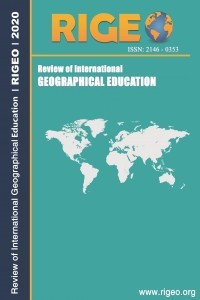Challenges and Opportunities in Combing the Competences of Formal Education and NGOs for Teaching Sustainability
Challenges and Opportunities in Combing the Competences of Formal Education and NGOs for Teaching Sustainability
Although the decade for Education for Sustainable Development has been well promoted in Germany it
still finds itself in a rather marginal position, both in the formal and in the informal educational sector.
This is at least partly due to the status it is given in the political debate that leads to different expectations
by different actors who operate in different frameworks. Thus teachers in formal education will have to
take general requirements of education for citizenship into consideration while NGOs are often focused on
improving environments and living conditions. Nonetheless there are numerous efforts for the two to join
forces. These efforts can be fruitful, if actors on both sides understand the needs and restrictions the other
side faces. In this article we want to explore the opportunities and challenges of cooperation between the
formal and informal educational sector with a view of giving partners a chance to better use their often
scarce resources.
Keywords:
NGOs, Cooperation With Schools, Content Sustainability, Pedagogical Process,
___
- BE-BB (Berlin – Brandenburg) (2014). Teil B. Fächerübergreifende Kompetenzentwicklung. Anhörungsfassung vom 28. 11. 2014. Ludwigsfelde: Selbstverlag.
- BREBIT (2015). Brandenburger Entwicklungspolitische Bildungs- and Informationstage, Retrieved from; http://www.brebit.org.
- Brunel, S. (2008). À qui profite le développement durable? Paris: Larousse.
- Bundeszentrale für Politische Bildung (2011). Beutelsbacher Konsens. Retrieved from: http://www.bpb.de/die-bpb/51310/beutelsbacher-konsens
- Burbage, F. (2013). Philosophie du développement durable. Paris: Presses Universitaires de France.
- Curren, R. (2009). Education for sustainable development: a philosophical assessment. Macclesfield: Philosophy of Education Society.
- Derickson, K. D. & Routledge, P . (2015). Resourcing Scholar -Activism: Collaboration, Transformation, and the Production of Knowledge, The Professional Geographer 67 (1), 1-7.
- Dubois-Maury, J. (2004). Le juriste confronté au développement durable. In Historiens & Géographes 387,189-194.
- Gathercole, C. & Prinzler, M. (2013). Nicht-Regierungsorganisationen (NGOs) als Unterstützer für den Geographieunterricht. Rolfes, M. & Uhlenwinkel, A. (eds.), Metzler Handbuch 2.0 Geographieunterricht. Ein Leitfaden für Praxis und Unterricht. Braunschweig: Westermann, pp. 114-122.
- Hemmer, I., Bagoly-Simó, P. & C. Fischer (2013). Koexistenz oder Kooperation? Bildung für nachhaltige Entwicklung an Hochschulen und Umweltbildungseinrichtungen. Geographie und ihre Didaktik / Journal of Geography Education, 41 (1), 1-17.
- Joppich, A. (2010). Think Global! Projekte zum Globalen Lernen in Schule und Jugendarbeit. Mülheim an der Ruhr: Verlag an der Ruhr.
- Krukowski, K. (2010). Sustainability strategies in recent German federal politics and law. Jus Navigandi 15 (2496), http://jus.com.br/artigos/14784.
- Malthouse, R. & Roffey-Barentsen, J. (2009). Reflective Practice in Education and Training. Los Angeles, London, New Delhi, Singapore, Washington DC: Sage.
- Marsden, B. (1997). On Taking the Geography Out of Geographical Education, Geography 82 (3), 241-252.
- Mayring, P. (2002). Einführung in die Qualitative Sozialforschung. Weinheim, Basel: Beltz.
- MBJS (Ministerium für Bildung, Jugend und Sport Land Brandenburg). (2008a). Rahmenlehrplan für die Sekundarstufe I. Geografie. Potsdam.
- MBJS (Ministerium für Bildung, Jugend und Sport Land Brandenburg). (2008b). Rahmenlehrplan für die Sekundarstufe I. Politische Bildung. Potsdam.
- MBJS (Ministerium für Bildung, Jugend und Sport Land Brandenburg). (2008c). Rahmenlehrplan für die Sekundarstufe I. Biologie. Potsdam.
- Möllers, C. (2009). Demokratie – Zumutungen und Versprechen. Berlin: Wagenbach.
- Nikel, J. & Reid, A. (2006). The role of responsibility in making sense of ‚Education for Sustainable Development‘: notes from a tri-country of student teachers‘understanding(s) of education, sustainable development and ESD. In Rieß, W. & Apel, H. (eds.), Bildung für eine nachhaltige Entwicklung. Aktuelle Forschungsfelder und -ansätze. Wiesbaden: VS Verlag für Sozialwissenschaften, pp. 51-67.
- Reuter, H. (2008). Politische Kommunikation von NGOs. Strategien gemeinnütziger Interessenvertretung. Saarbrücken: VDM-Verlag.
- Schulz, B. (2011). Basis- und Fachkonzepte im Geographieunterricht. Eine empirische Untersuchung. Potsdam (unpublished coursework at the University of Potsdam).
- Schulz, B. (2012). Globales Lernen. Evaluation der EPIZ-Seminare. Potsdam (unpublished BA- thesis at the University of Potsdam).
- SEPA (Swedish Environmental Protection Agency) (2005). Sustainable Consumption. Research and Policies. Stockholm: Naturvårdsverket.
- Solem, M., Lambert, D. & Tani, S. (2013). GeoCapabilities: Toward An International Framework for Researching the Purposes and Values of Geography Education, RIGEO, 3 (3), 214-229.
- Stewart, I. (2011). Cultures of Catastrophy. In Primary Geography, 76, 8-9.
- Taylor, L. (2008). Key concepts and medium term planning. In Teaching Geography, 33 (2), 50-54.
- Tide~ (2003). What is Development? Teaching about Development Issues at Key Stage 3. Birmingham.
- Uhlenwinkel, A. (2013a). Geographical Concepts als Strukturierungshilfe für den Geographieunterricht. Ein international erfolgreicher Weg zur Erlangung fachlicher Identität und gesellschaftlicher Relevanz. Geographie und ihre Didaktik / Journal of Geography Education, 41 (1), 18-43.
- Uhlenwinkel, A. (2013b). Geographisch Denken mit Hilfe von geographischen Konzepten. In Praxis Geographie, 43 (2), 4-7.
- Uhlenwinkel, A. (2013c). Lernen im Geographieunterricht: Trends und Kontroversen. In Kanwischer, D. (ed.), Geographiedidaktik. Ein Arbeitsbuch zur Gestaltung des Geographieunterrichts. Stuttgart: Borntraeger, 130-140.
- UNESCO (United Nations Educational, Scientific and Cultural Organisation) (2005). United Nations Decade of Education for Sustainable Development (2005-2014). International Implementation Scheme. Paris.
- Wolf, G. (2006). Wir sind was wir machen: Zum Problem pädagogischer Professionalität in der Bildung für nachhaltige Entwicklung. Rieß, W. & Apel, H. (eds.), Bildung für eine nachhaltige Entwicklung. Aktuelle Forschungsfelder und -ansätze. Wiesbaden: VS Verlag für Sozialwissenschaften, pp. 139-148.
- ISSN: 2146-0353
- Başlangıç: 2011
- Yayıncı: Eyüp ARTVİNLİ
Sayıdaki Diğer Makaleler
Designs, Techniques, and Reporting Strategies in Geography Education: A Review of Research Methods
Joann ZADROZNY, Caroline MCCLURE, Jinhee LEE, İnjeong JO
Perceptions of Geography Teachers to Integrating Technology to Teaching and their Practices
Cennet ŞANLI, Adem SEZER, Adnan PINAR
